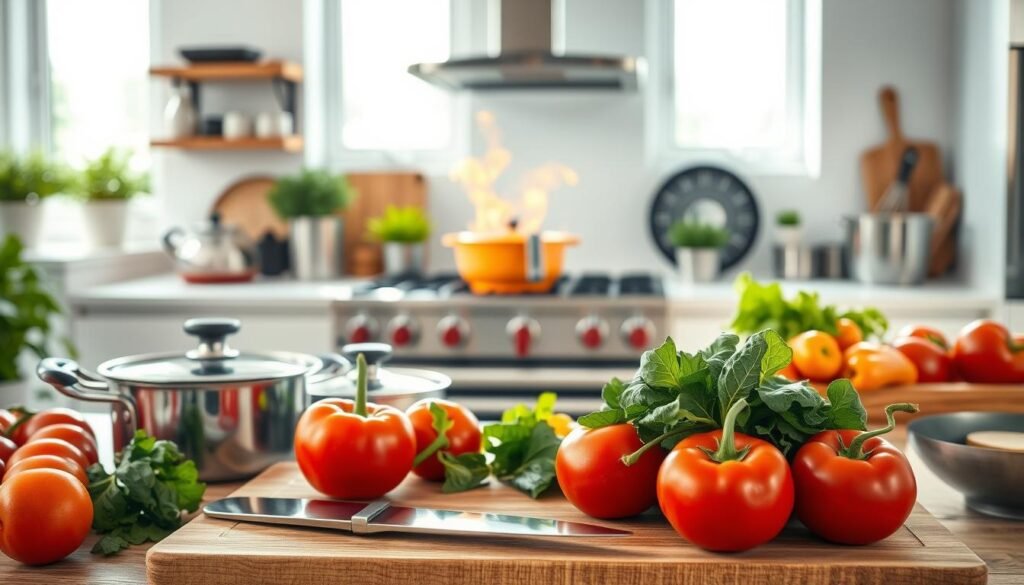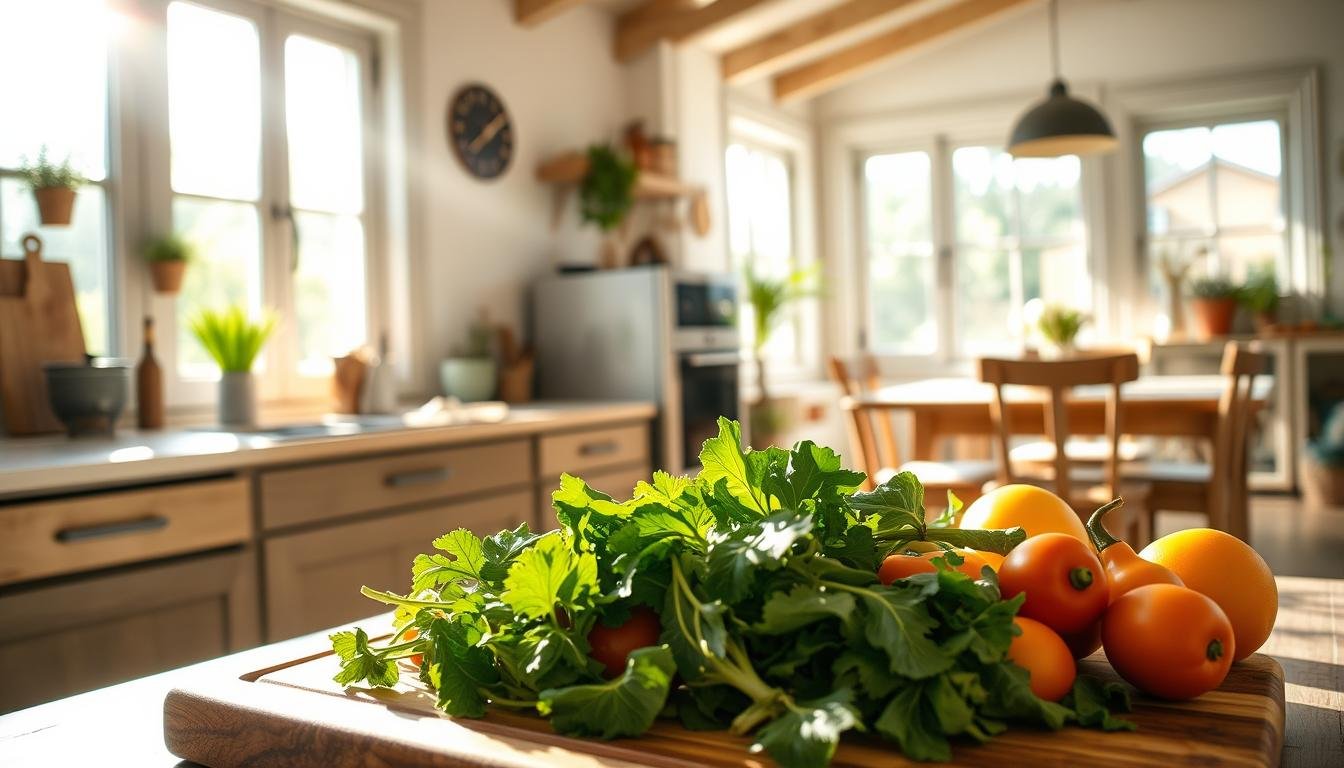Many American households now prepare breakfast, lunch, and dinner at home more frequently. This shift brings families together but also creates new challenges. Even experienced home cooks often feel unprepared for the ongoing demands of daily meal preparation.
Common concerns include busy schedules that make family meals seem impossible. Many people worry about food spoiling in the refrigerator or struggle with recipe uncertainty. These challenges often lead to expensive take-out solutions that don’t support long-term wellness goals.
This guide offers practical strategies to overcome these obstacles. You’ll discover how meal preparation at home benefits both your budget and health. The approach focuses on realistic methods that fit your actual schedule and living situation.
Building sustainable cooking practices doesn’t require perfection. It involves developing consistent habits that work for your family. This foundation supports a healthier lifestyle while saving money over time.
Key Takeaways
- Home meal preparation addresses both financial and health concerns affecting families nationwide
- Practical strategies can help overcome time constraints that make cooking seem impossible
- Developing kitchen skills forms the foundation for sustainable wellness practices
- Take-out meals cost significantly more and are less nutritious than home-prepared food
- Building cooking confidence requires perspective shifts rather than culinary expertise
- Meal preparation takes less time and effort than many people anticipate
- Consistent practice creates lasting benefits for physical health and financial stability
Cooking up some good nice lifestyle habits: Getting Started
Before you even pick up a knife, the most important ingredient for successful meal preparation is your attitude. Many people approach this process with unnecessary anxiety, imagining complex techniques and hours of work.
Changing Your Mindset About Cooking
Your beliefs about preparing meals directly impact your willingness to try. This experience should feel approachable rather than intimidating. Shifting your mindset is the first critical thing to address.
Cooking isn’t the overwhelming challenge many imagine. It’s actually a series of manageable steps you can learn gradually. Building confidence comes through small victories rather than attempting complex dishes immediately.
Building Basic Skills and Confidence
Start with one simple act that opens up a lot of possibilities. Learning to sauté an onion provides a foundational skill for countless recipes. This single technique becomes your gateway to culinary confidence.
Acquiring kitchen abilities doesn’t require formal training. It requires consistent practice and patience with your learning journey. Even professional chefs began with basic skills like chopping vegetables.
Making the way you prepare foods enjoyable ensures you’ll stick with developing this essential life skill. Celebrate each new technique you master, recognizing that every expert was once a beginner.
Master Essential Kitchen Techniques and Quick Meals
Weeknight dinners become stress-free when you adopt the practical ‘pizza rule’ for recipe selection. This approach ensures your meal preparation stays manageable during busy periods.
If a recipe takes longer than the time needed to order pizza, it’s too complex for weeknight preparation.
Simple Techniques for Everyday Cooking
Focus on recipes requiring thirty minutes or less. This time frame matches typical delivery wait times while providing healthier options.
Master steaming and sautéing for vegetables. These methods take under ten minutes and preserve nutritional value. A simple steamer basket becomes your most valuable kitchen tool.

Strategies for Planning Quick and Healthy Meals
Plan three meals for the week before shopping. Create a precise list containing only necessary ingredients. This strategy prevents food waste and saves money.
Weekend preparation makes weeknights easier. Cook larger portions to freeze for future meals. Doubling recipes provides ready-made options for busy days.
Utilizing Time-Saving Tips in the Kitchen
Prepare vegetables when you have free time. Wash and store them clean for immediate use. This mise en place approach streamlines cooking.
Keep emergency meal ideas for exhausted nights. Scrambled eggs, quick pasta, or veggie burgers take five minutes. Reliable resources include EatingWell and Cooking Light for fast recipes.
Building a Sustainable Cooking Plan with Mental Models and Social Norms
Sustainable home meal routines begin with psychological foundations that shape your daily food decisions. The first step involves creating mental models that frame preparation as rewarding rather than burdensome.
Develop thought patterns like “I create nutritious meals while saving money and having fun.” This internal narrative becomes part of your daily life and influences your behaviors positively.
Developing Mental Models for Healthy Living
Mental models serve as external representations of your thoughts. They form the basis for reasoning and decision-making in the kitchen.
| Negative Model | Positive Replacement | Resulting Behaviors |
|---|---|---|
| “Cooking is a chore” | “I gain nutritious meals and save money” | Consistent meal preparation |
| “I don’t have time” | “This takes less time than delivery” | Better time management |
| “I might fail” | “Each attempt builds my skills” | Willingness to experiment |
“The quality of your mental models determines the quality of your outcomes in the kitchen.”
Creating Social Norms that Encourage Home Cooking
The second step leverages social connections. Humans naturally desire to be part of communities, which you can use to reinforce positive behaviors.
Involve family members in meal preparation or watch cooking content together. These shared experiences create household norms that make cooking a collective activity rather than an isolated task.
Positive emotions during the process should be a primary goal. Enjoyment helps you make better decisions and maintain motivation day after day.
Identify prompts that generate positive feelings. Many people find music or natural light enhances their kitchen experience. These small things create a welcoming environment that supports lasting change.
Conclusion
Your journey toward sustainable meal preparation transforms more than just your plate—it reshapes your entire approach to nourishment. This comprehensive method addresses mindset, skills, and practical strategies that work for real families.
Remember that small, consistent actions create lasting change. Starting with one meal per week builds momentum as your confidence grows. These approaches make nutritious food preparation manageable even on busy nights.
Incorporate additional healthy eating tips like starting with soup, using smaller plates, and filling half your plate with vegetables. Simple ingredient swaps—applesauce for sugar, Greek yogurt for sour cream—make your recipes healthier without sacrificing taste.
View these changes as empowering tools that give you control over the foods you consume. The satisfaction of creating nourishing meals with your own hands brings genuine enjoyment to your daily routine.
For comprehensive wellness resources, explore our articles on nutrition, exercise, and stress management. These practices complement your new meal preparation habits for complete healthy living.




Leave a Comment